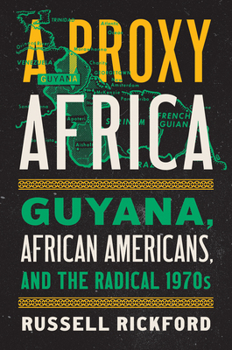A Proxy Africa: Guyana, African Americans, and the Radical 1970s (InterConnections: The Global Twentieth Century)
Nestled between Brazil, Venezuela, and Suriname, Guyana is the third-smallest sovereign state in mainland South America, and one of its youngest. Originally a Dutch colony, Guyana remained under British rule from the late eighteenth century until gaining independence in 1966 and becoming a republic in 1970. Apart from the 1978 mass murder-suicide of cult leader Jim Jones's followers in Jonestown, Guyana has been mostly peripheral to mainstream geopolitics. Yet for a generation of Black revolutionaries from around the world, Guyana was a vibrant site of pan-African activism. The country was particularly attractive to veterans of the US civil rights movement who sought alternative places to construct flourishing postcolonial, pan-African nation-states.
In this first, comprehensive history of Guyana's core role in anticolonial, Black internationalist movements in the 1960s and 1970s, historian Russell Rickford traces the history of African Americans who traveled to the country to work with, learn from, and teach Guyanese politicians, activists, and other international figures in the long fight for Black freedom. With encouragement from Prime Minister Forbes Burnham, they eagerly accepted the invitation to move to Guyana to establish new cooperative settlements. Rickford compellingly narrates Guyana's allure and promise for Black Americans, along with the limitations they faced when ideology clashed with lived realities--especially political ones--once there.





